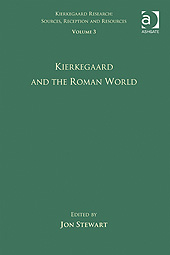

|

Volume 3:
Kierkegaard and the Roman World
Edited by
Jon Stewart
Farnham and Burlington: Ashgate 2009. xiii+219pp.
While Kierkegaard’s use of
the Greek authors, particularly Plato and Aristotle, has
attracted considerable attention over the years, his use of the
Roman authors has, by contrast, remained sadly neglected. This
neglect is somewhat surprising given the fact that Kierkegaard
was extremely well read in Latin from his early youth when he
attended the Borgerdyd School in Copenhagen.
Kierkegaard’s interest in the Roman authors is perhaps best
evidenced by his book collection. In his private library he had
a long list of Latin titles and Danish translations of the
standard Roman authors in any number of different genres. His
extensive and frequent use of writers such as Cicero, Horace,
Terence, Seneca, Suetonius and Ovid clearly warrants placing
them in the select group of his major sources.
The articles in the present volume demonstrate that Kierkegaard
made use of the Roman sources in a number of different ways. His
readings from the school seem to have stuck with him as an adult.
He constantly refers to Roman authors, such as Livy, Nepos, and
Suetonius for colorful stories and anecdotes. In addition, he
avails himself of pregnant sayings or formulations from the
Roman authors, when appropriate.
But his use of these authors is not merely as a rhetorical
source. He is also profoundly interested in the Roman philosophy
of Cicero, Seneca and Marcus Aurelius. Similarly, just as he is
fascinated by Tacitus’ portrayal of the early Christians, so
also he is amused by the humor of Terence and Apuleius. In short,
the Roman authors serve to enrich numerous aspects of Kierkegaard’s authorship with respect to both content
and form.
Table of Contents
Apuleius:
Under Indirect Influence:
Possible Apuleian Contributions to the Thought of Kierkegaard
Stacey E. Ake
Cicero: A Handy Roman Companion: Cicero’s Appearance in
Kierkegaard’s Works
Thomas Eske Rasmussen
Horace: The Art of Poetry and the Search for Meaning
Thomas Miles
Livy: The History of Rome in Kierkegaard’s Works
Nataliya Vorobyova
Marcus Aurelius: Kierkegaard’s Use and Abuse of the Stoic
Emperor
Rick Anthony Furtak
Nepos: Traces of Kierkegaard’s Use of an Edifying Roman
Biographer
Jon Stewart
Ovid: Of Love and Exile: Kierkegaard’s Appropriation of Ovid
Steven P. Sondrup
Sallust: Kierkegaard’s Scarce Use of a Great Roman Historian
Niels W. Bruun
Seneca: Disjecta Membra in Kierkegaard’s Writings
Niels W. Bruun
Suetonius: Exemplars of Truth and Madness: Kierkegaard’s Proverbial Uses of Suetonius’ Lives
Sebastian Høeg Gulmann
Tacitus: Christianity as odium generis humani
Jon Stewart
Terence: Traces of Roman Comedy in Kierkegaard’s Writings
Mikkel Larsen
Valerius Maximus: Moral Exempla in
Kierkegaard’s Writings
Nataliya Vorobyova
Virgil: From Farms to Empire: Kierkegaard’s Understanding
of
a Roman Poet
Steven P. Sondrup
|
Kierkegaard and the Bible,
Tomes I-II

Kierkegaard and the
Greek World,
Tomes I-II

Kierkegaard and the
Roman World

Kierkegaard and the
Patristic and
Medieval Traditions

Kierkegaard and the
Renaissance and
Modern Traditions,
Tomes I-III

Kierkegaard and his
German Contemporaries,
Tomes I-III

Kierkegaard and his
Danish Contemporaries,
Tomes I-III

|
The
series Kierkegaard Research: Sources,
Reception and Resources is published Routledge Research, Philosophy
Routledge / Taylor & Francis Group, 711 Third Ave., Eighth Floor, New York, NY 10017, USA
Jon Stewart©2007-2020
|













